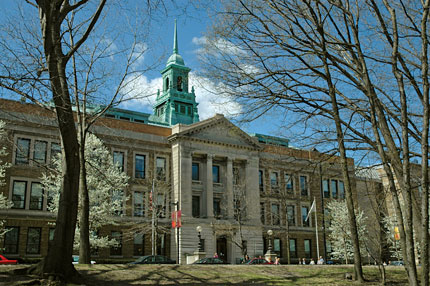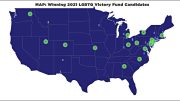
Simmons College recently announced a new undergraduate transgender admissions policy.
Photo: Simmons College
By: Clara Lefton/ TRT Reporter—
BOSTON, Mass.—This Fall, Simmons College became the third traditional women’s college in the United States to welcome transgender women as students, according to an announcement made by Simmons President Helen Drinan, a Mount Holyoke graduate, who wrote a letter to the undergraduates and published a piece in The Huffington Post.
“In recent years, we have seen an evolution in societal norms surrounding gender identity and expression. Traditional notions of womanhood and femaleness are being challenged, and new laws are emerging to protect transgender individuals, i.e. those who do not subscribe to the traditional gender binary,” Drinan explained in her note to the Simmons community.
The new policy will specifically apply to undergraduates, as the graduate programs at Simmons are co-educational. The school’s latest admissions rule details that it will be accepting students born female, as well as those who identify as female, but were born as male; this also includes transmen who were born female. Although this is the first time Simmons has openly addressed their policies towards admitting people other than whose who were born female, in the past they have admitted these students, as well as those who are gender variant. This formalized policy includes the input of a Simmons Transgender Task Force that incorporated a variety of professors, registrars, trustees and more. [pullquote]“Women’s colleges were created to empower women to go into any field that they want and be able to do whatever they want—fighting against patriarchy and breaking down ‘male-dominated’ fields and gendered norms,” explained Erin Butterfield, Simmons Class of 2015.[/pullquote]
“Women’s colleges were created to empower women to go into any field that they want and be able to do whatever they want—fighting against patriarchy and breaking down ‘male-dominated’ fields and gendered norms,” explained Erin Butterfield, Simmons Class of 2015. “Therefore, accepting anyone who is not a cis-man—someone who is born a man and identifies as such—follows those values completely. Gender nonconforming people who were born female and trans men can come to Simmons because they were raised as females and have faced oppression and patriarchy. Trans women are women, so of course they are welcome.”
Since these three colleges have changed their admissions policies in the last year, it has sparked a debate among other schools as to whether or not they should change their admissions policies as well. All three of the school’s current policies do not explicitly require transgender people to undergo medical hormonal adjustments, gender reassignment surgery or legal name change. The only specific criteria for those who are born male is for them to self-identify as women in order to be admitted.
“I am against Mount Holyoke’s policy to admit and allow continued enrollment of students who were not born biologically female or identify as male,” said Aria Berliner, who graduated from Mount Holyoke in 2010. “Without proof, what’s stopping someone from exploiting the policy from attending Mount Holyoke? [It’s] a great school and I know male students from the surrounding colleges who have taken courses at Mount Holyoke because of its academic rigor and diverse course offerings. How does [the school] ensure that biologically born male applicants that identify as male do not take advantage of the system?”
The new admissions policies also open up a debate as to whether or not women’s colleges should admit students who were born female but later identify as men. According to some, these policies may send mixed messages as to whether or not they acknowledge trans men’s identities as seriously as trans women’s.[pullquote] “Gender nonconforming people who were born female and trans men can come to Simmons because they were raised as females and have faced oppression and patriarchy. Trans women are women, so of course they are welcome.”—Erin Butterfield, Simmons Class of 2015[/pullquote]
“I do have a problem [when] a woman decides to attend a women’s college and then decides to go through with the biological changes: taking hormones to become a trans male, while attending the institution. They knowingly chose to attend a women’s college fully knowing that it is a women’s college, and when you start to take the hormones, you are not a woman and should not be at a women’s college. You can go by a male name, dress masculine, etcetera, but not change your biological make-up,” said Deborah Birch, who expects to graduate in 2016 from Hollins College, a women’s college in Virginia. “If an individual decides to start taking hormones and going through the biological changes, then the women’s college they currently attend should ‘150%’ fairly help the student with the transfer process to a new college.”
Currently, the pool for women’s colleges is shrinking with only 46 left from the 200 that existed in 1960. Of the three women’s colleges that have changed their policies to include transgender women, two of them are based in Massachusetts.
“I am so excited that these institutions are, what I see, as staying true to their mission and the reason they were founded,” said Mason Dunn, the executive director of the Massachusetts Transgender Political Coalition. “In my mind these women’s colleges were founded on a principle that no one should be denied access to education on the basis of their gender. So when women’s colleges are embracing and accepting applications from trans women and non-binary identified individuals, they are really staying true to that.”
Another recent catalyst for these admissions policy changes was a ruling by the Department of Education this past April allowing transgender students to be defended from prejudice under Title IX, a 1972 ruling that bans discrimination based on sex. Therefore, women’s colleges have the potential to lose funding if they refuse admission to trans women.
To read the full statement about Simmons’ new admissions policy and the policy itself, visit tiny.cc/j51vpx.







